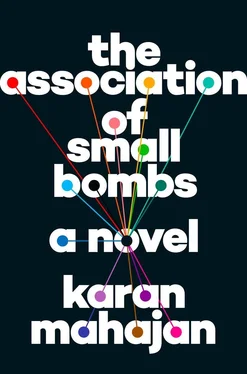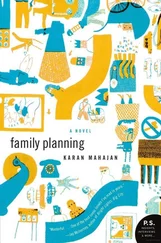“Whatever it is, there should have been more damage,” Shockie said. “I looked at it after I left. I shouldn’t have done that — it was dangerous — but the bomb only made a phut sound and I thought better to look than waste a month of work. Nothing happened, yaar. A few buildings fell. A few people were burning.” He looked at his friend, trying to gauge his response to this violent reenactment. “My personal philosophy is, if we’re fighting a war, we should try to kill people, not injure them. You’ve seen what injury does.” Malik had a limp from being severely beaten by the military years ago. It was a turning point for their friendship and their involvement with the conflict. Shockie had knifed a soldier on Malik’s behalf. From that time on they had been inseparable, tied to each other even if they didn’t quite want to be. Their relationship, really, was a kind of marriage, held in place by a massive history. “How is your foot?” Shockie asked.
“Fine, fine,” Malik said. “Pain is all in the mind.” Talking about his foot put him in a bad mood and he changed the subject. “Were you able to go to Sagar?”
Sagar was their favorite restaurant in Delhi.
“Not this time.”
Now they walked in happy silence, Shockie contemplating Malik’s injury and their joint past, Malik contemplating the road, the hills, the twisting smoke fires. He was a bright person with a wonderful eye for detail; the limp had slowed him down, but it had also slowed the world around him. He missed nothing and he remembered everything; when he closed his eyes he could re-create a landscape down to the smallest leaf.
This was how he calmed himself through moments of pain. He painted too — it was a good way to make use of his photographic memory.
The two men arrived at a valley packed with boulders of many sizes and a clear mountain stream and they stripped down to their underwear and swam. Malik felt the water against his penis, which had been burned and electrocuted during the torture. Sometimes he felt swimming in natural streams, with their rich purse of minerals, might solve his problems. Shockie, broad and muscled, made unnecessary strokes in the water next to him.
After they were done, they rested on flat rocks and let their bodies roast in the sun. They held hands like lovers, though there was nothing sexual about this.
How could it be that only four days ago I was in Delhi planting a bomb? Shockie wondered. And now I’m here? The birds overhead were fervent in their high-pitched complaints. A surge of brightness passed over him. He hugged Malik and briefly fell asleep.
________
After this excursion, Shockie went to visit Abdul, the leader of the group.
Abdul was a schoolteacher; when Shockie entered the classroom in the half-caved-in house that served as a school, Abdul was teaching the Sanskrit poet Kaˉlidaˉsa to a group of rapt ten-year-old girls sitting on the floor with plaited hair and black shoes and gray uniforms, hunched over notebooks. Water leaked from the ceiling to a spot between two girls but they didn’t seem to notice. Abdul’s hand moved up and down the blackboard and his mouth made mechanical sounds. Set among the schoolgirls, he seemed even taller and bonier than usual, his cheekbones jutting from his face and his fingers fragile and long, an unnecessary shawl around his shoulders. When he saw Shockie, he smiled a weak smile, cut off his lecturing abruptly, and without saying anything to the girls, went to embrace him.
Shockie allowed a half smile as the man’s arms went around him. He knew the eyes of twenty girls were on him.
“Welcome back,” Abdul said, straightening up and thumping his shoulders. “I was worried about you. When did you arrive?”
“Just yesterday,” Shockie said. “Should we go outside?”
“Of course, of course.”
As they walked to the carpet shop (another of Abdul’s businesses), Shockie crossed a puddle and was reminded of the deep lilac pool of mountain water from the morning.
The bomb — all bombs — seemed far away.
In back of the carpet shop, Shockie talked about the operation in Delhi. “You need to give us more funds,” he said. “When I first made the chocolate, no one would eat it. I tried feeding it on the nineteenth, but the shopkeepers refused. I had to take it back and bake it again. Then only it went off on the twenty-first,” he said, breaking code without realizing it. “Everything OK?” he asked, with irritation. “You look distracted.”
“Yes, yes, but I have good news.”
“What?” Shockie said, mildly irritated by the inattention.
“You are going to meet the leader of the Hubli Faction.”
The Hubli Faction was a terrorist group based in South India. For years, the members of the JKIF had been trying to extend their links to other terrorist outfits, but without success; Shockie, who had joined the group when he was twenty, and was now twenty-six, had been a chief proponent of this networking. Still, he tried to not show too much enthusiasm. “First listen to me,” Shockie said. Speaking slowly, he finished his story about the chocolate in Delhi, sprinkling it with unnecessary details. Eventually, though, he said, “Tell me about the Hubli Faction.”
Abdul now gave a confusing story about how he had dealt with several middlemen to finally get in touch with an agent who was running a training camp in the forests near Hubli.
Shockie’s mind was elsewhere. He was looking at the objects in this back room: rolled-up carpets, old plastic chairs, buckets. What was he doing here? Were they cracked to have such delusions of grandeur, to think they could shake up India from a carpet shop? And now they were going to meet the Hubli Faction? “When do you want me to go?” he asked.
“Tomorrow,” Abdul said.
Shockie fell silent.
“What?” Abdul asked.
“Can Malik come with me?”
Abdul laughed. “You’re being serious?”
“Yes.”
Abdul laughed again and shook his head.
________
Malik had a reputation as something of a thinker in the group. This wasn’t a positive appellation: he was regularly derided by the others as being effeminate, confused, contradictory, ineffectual, and eccentric. He offered the most fantastic ideas at group meetings at the back of the carpet shop. “We should write letters to the victims and families of victims of attacks,” he’d said once. “After all, what these victims go through is similar to what we all have gone through as Kashmiris. Something bad happens to them, they expect the government to help them and instead the government ignores them. Yesterday I was reading in the Hindustan Times that most blast victims don’t get compensation for two or three years. I’m telling you, all these people — eventually they turn not against us but against the government. If you want a true Islamic revolution in this country — not just fighting selfishly for our small aims — then we need to win over these people, show our solidarity with them, tell them that our hands were tied, we were only trying to expose to them the callousness of the people they have chosen to elect.” There were tears in his eyes, as usual, from his own eloquence. “Only then can we depose the central government.”
“Anything else, Malik?”
“Yes,” he’d say, continuing, everyone watching with bemused expressions and grinning quite openly at each other.
Malik did not appear to notice. But Shockie always felt a little bad for his friend. “You aren’t appreciated here,” he often said. “You should have been a professor.”
“But I can contribute much more as a writer here.” Malik was the publisher and propagandist in the group and very proud of it.
Poor innocent Malik! Shockie thought. What could he contribute? He was only tolerated because Shockie was his protector and benefactor and Shockie was the top bomb maker in the group. And yet Shockie loved him. Being in the group meant eschewing relationships with women and this was the closest Shockie could come to re-creating the tenderness one felt toward a woman. They were roommates and Shockie often asked what Malik was reading. Gandhi, he might say. Or Tolstoy. Or Pushkin. What does he make of himself? Shockie wondered. Does he really have no idea how pathetic he is? But Malik appeared innocent about his own oddness. Perhaps the injury to his leg and penis had made him a little blind, had given him the aspect of a holy fool, as if that were the only way to deal with the horror that had been inflicted upon him — Shockie had seen this with other cripples, too: a strange light, maybe the light of death, bleeding around the edges of their dull corneas.
Читать дальше












